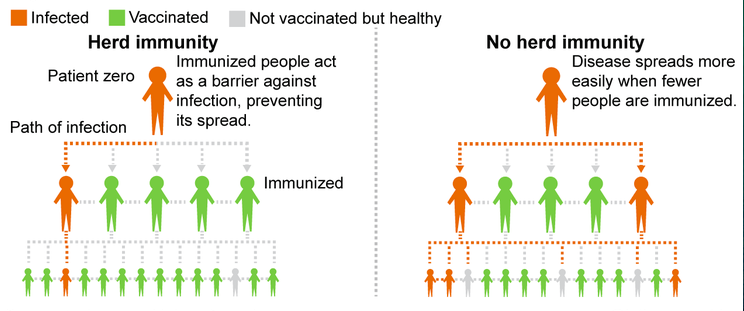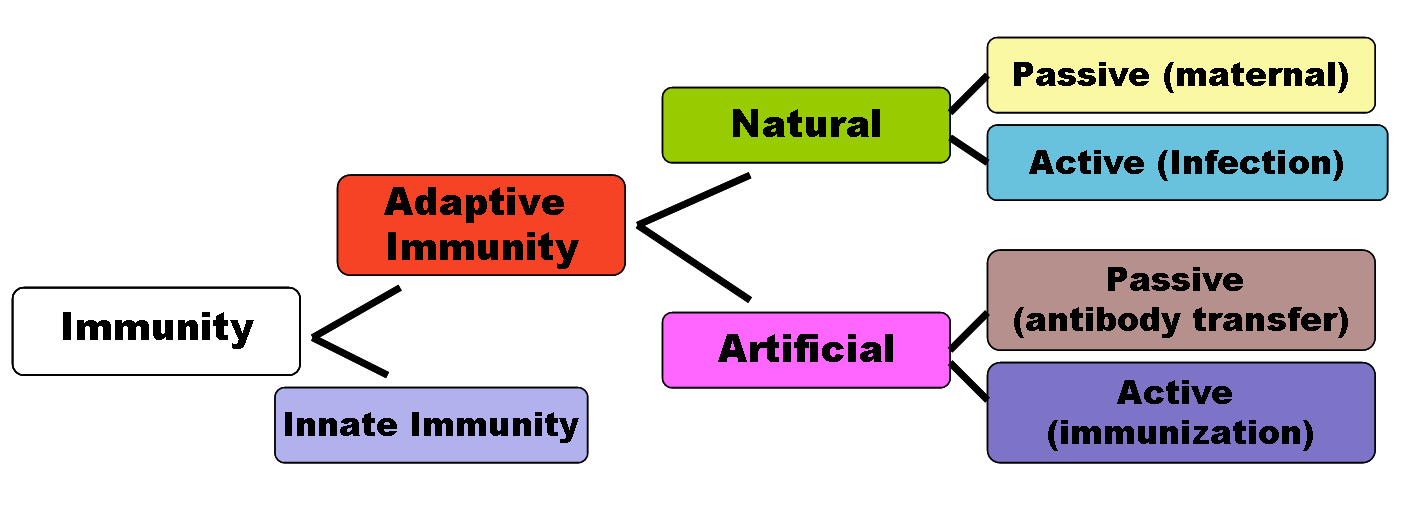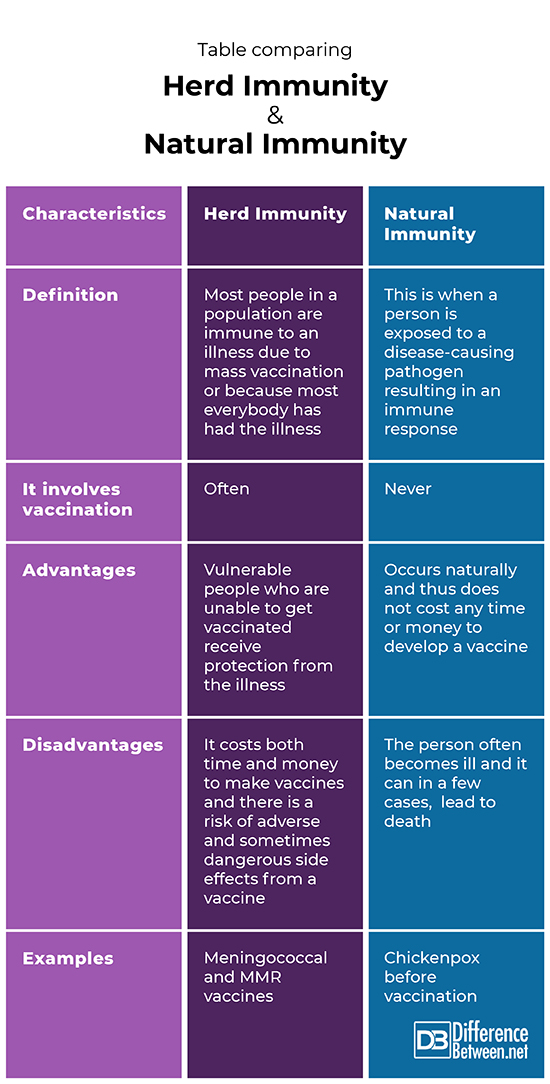Difference Between Herd Immunity and Natural Immunity
Herd immunity is when a substantial number of individuals in a population are immune to a specific illness. Natural immunity is when an individual develops immunity after being exposed to a live pathogen.

What is Herd Immunity?
Definition:
Herd immunity is when a large number of people in the population are immune to a particular disease; this occurs due to enough people either catching the disease, or due to mass vaccination of the population.
How it works:
People produce an immune response to a pathogen or part of a pathogen. They develop an immune memory which protects them if exposed later on to the same disease-causing pathogen; this most often happens with viruses. Once enough people are immune, the disease does not spread as much and may even become very rare in the population.
Examples:
Examples of herd immunity include the MMR and the meningococcal vaccination programs, in which most of the population is vaccinated such that these illnesses are now quite uncommon. The MMR vaccine protects people against measles, mumps, and rubella. The meningococcal vaccine protects individuals from getting a particular type of meningitis. Herd immunity from people becoming ill with COVID-19 does not appear to be working even when several individuals become sick, although the recent start of a vaccination program offers hope that herd immunity can be achieved.
Advantages:
Mass vaccination to achieve herd immunity often works and helps for people who cannot receive a vaccine for whatever reason. It is hoped that the COVID-19 vaccination programs that have begun in the United Kingdom and the United States, will enable the populations of these countries at least to achieve herd immunity against the coronavirus.
Disadvantages:
Vaccination for herd immunity is expensive, not only in research and development but in actually preparing and administering the vaccine. There is also a risk of adverse events, for instance, in the case of some COVID-19 vaccines, severe reactions can occur in people who have a history of bad allergies. Currently such reactions do appear to be very rare for the COVID-19 vaccine.

What is Natural immunity?
Definition:
Natural immunity is an immune response that occurs naturally in the body in response to a pathogen. This occurs when a person is exposed to the pathogen causing a disease.
How it works:
The immune system, upon detecting a foreign organism or virus triggers B lymphocytes to produce antibodies to attack the pathogen. T lymphocytes are also activated in response and can function to directly kill the pathogen or regulate the level of the response.
Examples:
There are many examples of natural immunity, for instance, chickenpox. In this case, once a person has caught chickenpox without any vaccination, they can’t catch it a second time, although it makes them vulnerable to shingles later in life. Natural immunity is also acquired by a fetus from the mother through the placenta and also through breast milk.
Advantages:
There is no need for vaccination, which costs money and time to develop and administer. Some types of natural immunity are passed on to a fetus from the mother, which is a big benefit for the child.
Disadvantages:
Often to obtain natural immunity to a specific pathogen the person has to catch the virus or bacterium and then recover. This can mean the person is sick and may even die in extreme cases.
Difference between Herd immunity and Natural immunity?
Definition
Herd immunity is when a substantial number of people in a population are immune to an illness. Natural immunity is when a person is exposed to a pathogen and develops an immune response as a result.
It involves vaccination
Herd immunity often does result from mass vaccination of a population against an illness. Natural immunity occurs naturally in the human body, in other words, it happens when exposed to an actual pathogen and not from a vaccine.
Advantages
The advantage of herd immunity is that it protects people who are vulnerable and unable to get a vaccine. The advantage of natural immunity is that it happens without needing a vaccine which costs money and time to make and distribute.
Disadvantages
A disadvantage of herd immunity is that large numbers of people have to be vaccinated for it to work and there is also the risk of severe side effects in some people. A disadvantage of natural immunity is that a person has to catch the illness and often becomes sick, and may be at risk of death.
Examples
Herd immunity has resulted from widespread use of the MMR and meningococcal vaccines. A good example of natural immunity is chickenpox, where most people who have had chickenpox do not get sick with it again.
Table comparing Herd immunity and Natural immunity

Summary of Herd immunity Vs. Natural immunity
- Herd immunity is when large numbers of people are immune to a pathogen, often as a result of vaccination.
- Natural immunity is when a person’s immune system responds to becoming infected with a specific live pathogen.
- In the case of the COVID-19 virus, vaccination has begun with the hopes that herd immunity can be acquired in the population.
- Difference Between Rumination and Regurgitation - June 13, 2024
- Difference Between Pyelectasis and Hydronephrosis - June 4, 2024
- Difference Between Cellulitis and Erysipelas - June 1, 2024
Search DifferenceBetween.net :
Leave a Response
References :
[0]Doshi, Peter. "Covid-19: Do many people have pre-existing immunity?" bmj 370 (2020).
[1]Fine, Paul, Ken Eames, and David L. Heymann. "“Herd immunity”: a rough guide." Clinical infectious diseases 52.7 (2011): 911-916.
[2]Rashid, Harunor, Gulam Khandaker, and Robert Booy. "Vaccination and herd immunity: what more do we know? " Current opinion in infectious diseases 25.3 (2012): 243-249.
[3]Image credit: https://commons.wikimedia.org/wiki/File:Immunity.png
[4]Image credit: https://commons.wikimedia.org/wiki/File:Herd_Immunity_vs_Without_Herd_Immunity_.png
